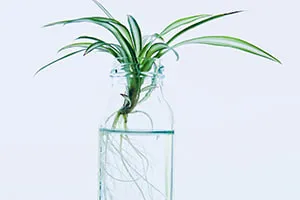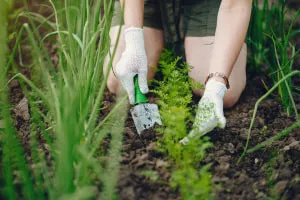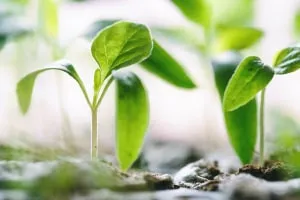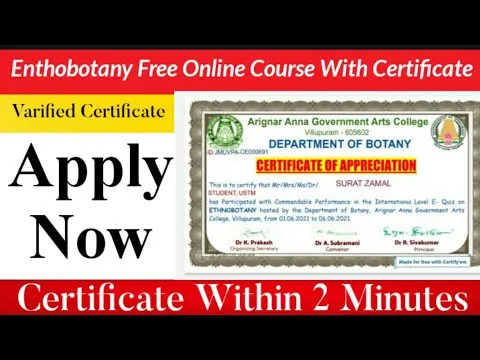
Fundamentals of Plant Science for Gardeners 
Discover the secrets of plant science with the Fundamentals of Plant Science for Gardeners course. Uncover the evolution and classification of plants, and learn how to care for them based on their preferred conditions. Dive into the processes of photosynthesis, respiration, translocation, and transpiration to understand plant health. From seed dormancy to fruit production, explore the key stages of plant growth and gain the skills to break dormancy, prune successfully, induce flowering, and maintain genetic diversity. With this knowledge, you'll become a better gardener and have happy, thriving plants. Enroll now and unlock the fascinating world of plant physiology. ▼
ADVERTISEMENT
Course Feature
![]() Cost:
Cost:
Free
![]() Provider:
Provider:
Alison
![]() Certificate:
Certificate:
No Information
![]() Language:
Language:
English
Course Overview
❗The content presented here is sourced directly from Alison platform. For comprehensive course details, including enrollment information, simply click on the 'Go to class' link on our website.
Updated in [September 27th, 2023]
What does this course tell?
(Please note that the following overview content is from the original platform)In this course, you will learn the science behind our best horticultural practices, which look at the evolution of plants and how flowering plants came to be the largest and most diverse group. Furthermore, you will have the opportunity to see how plants are classified within their taxonomic system and consider the conditions preferred by groups of plants to understand how to care for your plants. To better understand plant health, you will trace the link between the plant processes of photosynthesis, respiration, translocation and transpiration.
As you continue through this course, we lay out the key stages of plant growth following a plant's life, from seed to fruit production. Initially, you will learn about seed dormancy, giving you the skills to break dormancy and germinate any seed. Then we outline the essential plant organs that work together with the plant processes to produce healthy growth. By viewing the phenomenon of apical dominance, you can prune any plant successfully. You will also learn to induce plants to flower and maintain genetic diversity. Next, we cover the fascinating subject of plant hormones and explain how to apply them to aid the growth of our plants in specific ways. Finally, by understanding how plants adapt to their surroundings, you will know exactly where to place your plants.
So, whether you want to become a better gardener or you intend to follow a career in horticulture, this course will give you a sound knowledge of plant physiology. Understanding how plants work will help you solve any difficulties, decide the best place for your plants, grow better food and instinctively know how to care for any plant you come across. You will acquire expertise in a plant's remarkable life and behaviour in just a few hours. As a result, you will have happy plants. So wait no more and enrol in this course.
We considered the value of this course from many aspects, and finally summarized it for you from two aspects: skills and knowledge, and the people who benefit from it:
(Please note that our content is optimized through artificial intelligence tools and carefully reviewed by our editorial staff.)
What skills and knowledge will you acquire during this course?
During this course, learners will acquire the following skills and knowledge:
1. Understanding the evolution and diversity of plants: Learners will gain knowledge about the evolution of plants and how flowering plants became the largest and most diverse group. This understanding will help them appreciate the different characteristics and needs of various plant species.
2. Plant classification and care: Learners will learn how plants are classified within their taxonomic system. They will also understand the preferred conditions for different groups of plants, enabling them to provide appropriate care and create suitable environments for their plants.
3. Plant processes: Learners will trace the link between important plant processes such as photosynthesis, respiration, translocation, and transpiration. This knowledge will help them understand the health and functioning of plants, enabling them to identify and address any issues that may arise.
4. Plant growth stages: Learners will be guided through the key stages of plant growth, from seed to fruit production. They will learn about seed dormancy and how to break it to successfully germinate any seed. They will also gain knowledge about essential plant organs and their role in healthy growth. Additionally, learners will understand the phenomenon of apical dominance and how to prune plants effectively. They will also learn techniques to induce flowering and maintain genetic diversity.
5. Plant hormones: Learners will explore the fascinating subject of plant hormones and their application in aiding plant growth in specific ways. They will understand how to use plant hormones to manipulate plant behavior and achieve desired outcomes.
6. Plant adaptation: Learners will gain an understanding of how plants adapt to their surroundings. This knowledge will help them determine the best placement for their plants, taking into account factors such as light, temperature, and soil conditions.
Who will benefit from this course?
This course on Fundamentals of Plant Science for Gardeners will benefit individuals who have an interest in gardening or those who are pursuing a career in horticulture.
Gardeners of all levels, from beginners to experienced, will benefit from this course as it provides a comprehensive understanding of the science behind horticultural practices. By learning about the evolution of plants and their classification within the taxonomic system, gardeners will be able to make informed decisions about the care and maintenance of their plants. They will gain knowledge about the preferred conditions for different groups of plants, allowing them to create optimal growing environments.
The course also covers important plant processes such as photosynthesis, respiration, translocation, and transpiration, which are essential for maintaining plant health. By understanding these processes, gardeners will be able to identify and address any issues that may arise, ensuring the well-being of their plants.
Furthermore, the course delves into the various stages of plant growth, from seed dormancy to fruit production. Gardeners will learn how to break seed dormancy and successfully germinate any seed. They will also gain insights into plant organs and their functions, enabling them to prune plants effectively and induce flowering.
The course also explores the topic of plant hormones and their application in aiding plant growth. This knowledge will allow gardeners to manipulate plant growth in specific ways, promoting healthier and more productive plants.
Lastly, understanding how plants adapt to their surroundings will help gardeners determine the best placement for their plants. By considering factors such as light, temperature, and soil conditions, gardeners can create optimal growing environments for their plants.
Course Syllabus
The Evolution of Plants
In this module, you will learn how land plants evolved and how this, in turn, is the basis for the biological plant groups. You will learn the characteristics of each plant group, the conditions they prefer and how you can apply this to your gardening practices. You will then look at the taxonomic classification system.Plant Processes
In this module, you will learn about the plant processes that drive the growth and development of plants. You will be introduced to photosynthesis - the process that drives all life on Earth. You will look at plant respiration, translocation and transpiration and how these processes work. Knowledge of the plant processes is key to good plant care.Stages of Growth in Flowering Plants
In this module, you will learn about the main stages of plant growth. You will follow the life stages of flowering plants from the embryonic stage through the end of life. You will look at the main plant organs, the parts of plants relevant to these organs and how they contribute to plant growth and development.Plant Hormones and Plant Growth Regulators
In this module, you will learn about the discovery of plant hormones and how they act as chemical messengers. First, you will study the five classical and more recently discovered hormones. Then you will look at how plant growth regulators containing plant hormones are used in horticulture.Factors Limiting Plant Growth and Adaptations
In this module, you will consider the limiting factors to plant growth - light, temperature, nutrition and water. You will look at examples of how plants have adapted to cope with certain limiting factors, which will help you understand where to place plants for maximum growth and health.Course assessment
Course Provider

Provider Alison's Stats at AZClass
Discussion and Reviews
0.0 (Based on 0 reviews)
Explore Similar Online Courses

Developmental Biology - Root and Shoot Growth

Basics of Horticulture

Python for Informatics: Exploring Information

Social Network Analysis

Introduction to Systematic Review and Meta-Analysis

The Analytics Edge

DCO042 - Python For Informatics

Causal Diagrams: Draw Your Assumptions Before Your Conclusions

Whole genome sequencing of bacterial genomes - tools and applications

Understanding Plant Metabolism

Enthobotany Free Online Course With Certificate I Free Certificate I Botany I Digital Classroom I


Start your review of Fundamentals of Plant Science for Gardeners